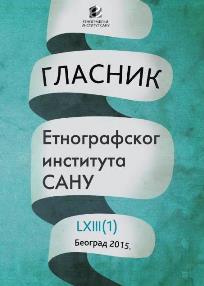Слава или Крсно име код Срба
The Slava or Patron Saint’s Day among the Serbs
Author(s): Nikola F. PavkovićSubject(s): Customs / Folklore, Eastern Orthodoxy
Published by: Етнографски институт САНУ
Keywords: Slava; Serbs; Christianity; Orthodox Church; national identity
Summary/Abstract: The Slava has been a folk-religious holiday among the Serbs for centuries. As the cult of a specific Christian saint within the family (genus, tribe), a protector and giver, over time many common structural elements of the ritual emerged. However, the ways of celebrating, ritual meals and duration of the Slava have certain local variances which are caused by folk- religious traditions as well as the wider (state) and socio-political context. From the 13th century onward the Slava has been under a strong influence from the Serbian Ortho-dox Church. The contemporary way of celebrating the Slava has been formed by the Church. Some authors have considered the Slava a marker of Serbian national identity. The Slava is a social and spiritual good passed down from father to son. In matrilocal marriage, the son in law accepts the Slava from his father in law, and keeps his own as secondary. Over the centuries here were many limitations and even bans on the practice of the Slava, most notably imposed on the Serbs by the Venetian republic and the Austro-Hungarian Empire – all with the aim of imposing a union of the faith with the Vatican and turning the Or-thodox faithful over to Catholicism.
Journal: Гласник Етнографског института САНУ
- Issue Year: LXIII/2015
- Issue No: 1
- Page Range: 123-145
- Page Count: 23
- Language: Serbian

